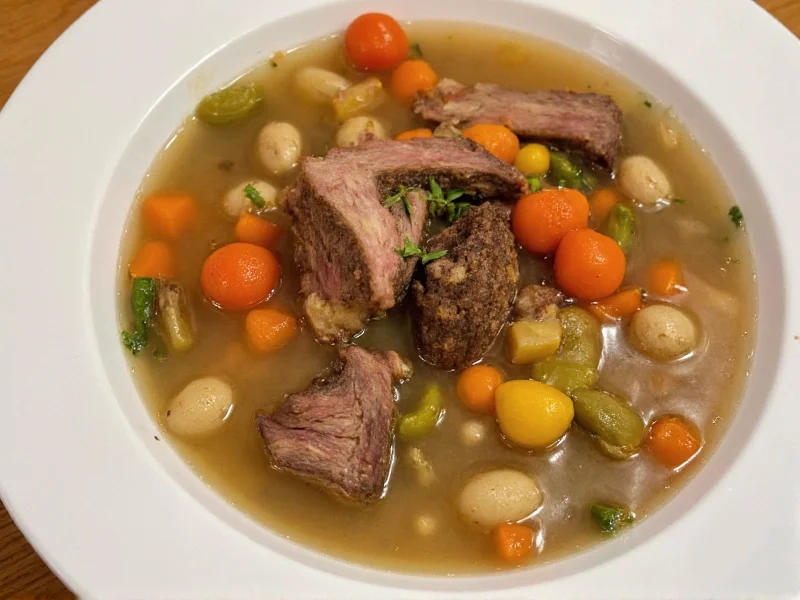Transforming prime rib leftovers into soup is one of the most economical and delicious ways to extend the life of this premium cut. Many home chefs mistakenly discard bones and trimmings, not realizing they contain deep beefy flavors perfect for creating restaurant-quality soup. This prime rib soup recipe maximizes every component of your roast—using bones for broth, fat for richness, and meat for hearty bites.
Essential Ingredients for Prime Rib Soup
Gathering quality ingredients makes the difference between ordinary and extraordinary soup. For an authentic prime rib soup recipe, you'll need:
- 2-3 cups leftover prime rib (bones, trimmings, and meat)
- 1 large onion, diced
- 2 carrots, peeled and chopped
- 2 celery stalks, chopped
- 3 garlic cloves, minced
- 8 cups beef broth (low sodium)
- 2 tablespoons tomato paste
- 1 tablespoon Worcestershire sauce
- 1 bay leaf
- 1 teaspoon fresh thyme (or ½ tsp dried)
- Salt and freshly ground black pepper to taste
- 2 tablespoons olive oil
- Optional: 1 cup diced potatoes or barley for heartiness
Step-by-Step Prime Rib Soup Preparation
Broth Foundation (1 hour)
The secret to exceptional prime rib soup recipe success lies in the broth. Begin by placing bones and any fatty trimmings in a large stockpot. Cover with 10 cups of cold water and bring to a gentle simmer (not boil) for 45 minutes. Skim impurities that rise to the surface. Add 1 chopped onion, 1 chopped carrot, and 1 celery stalk. Simmer uncovered for another 15 minutes. Strain the broth, discarding solids—this creates your rich base.
Soup Assembly (30 minutes)
| Step | Time | Key Technique |
|---|---|---|
| Sauté vegetables | 8-10 minutes | Medium heat until translucent |
| Add tomato paste | 2 minutes | Stir constantly to caramelize |
| Simmer soup | 20 minutes | Gentle bubbles, not rolling boil |
| Add meat | 2 minutes | Just before serving to maintain tenderness |
Heat olive oil in a clean pot over medium heat. Add remaining diced onion, carrot, and celery, cooking until softened. Stir in tomato paste and cook for 2 minutes until it darkens slightly. Add the prepared broth, Worcestershire sauce, bay leaf, and thyme. If using potatoes or barley, add them now. Simmer for 20 minutes to meld flavors. Just before serving, add thinly sliced prime rib meat and heat through for 2 minutes—any longer will toughen the beef.
Pro Tips for Perfect Prime Rib Soup
Mastering this leftover prime rib soup recipe requires attention to detail:
- Chill bones first: Refrigerate bones overnight before making broth—this makes fat easier to remove after simmering
- Acid balance: A splash of red wine vinegar (1 tsp) just before serving brightens rich flavors
- Texture control: For creamy prime rib soup recipe variation, blend half the soup before adding meat
- Salt timing: Season at the end since prime rib releases salt as it cooks
- Meat addition: Always add sliced prime rib during final minutes to prevent overcooking
Variations to Enhance Your Prime Rib Soup
Customize this versatile prime rib bone broth soup to match your preferences:
- French onion style: Caramelize extra onions and top with toasted baguette slices and Gruyère cheese
- Asian fusion: Replace Worcestershire with soy sauce and add ginger and star anise
- Hearty prime rib vegetable soup: Add diced parsnips, turnips, and kale during final simmer
- Creamy version: Stir in ½ cup heavy cream or coconut milk at the end for luxurious texture
Storage and Reheating Guidelines
This beef prime rib soup recipe stores exceptionally well. Cool completely before transferring to airtight containers. Refrigerate for up to 4 days or freeze for 3 months. When reheating, do so gently over medium-low heat—never boil, as this toughens the meat. If frozen, thaw overnight in the refrigerator before reheating. The soup often tastes even better the second day as flavors continue to meld.
Frequently Asked Questions
Can I make prime rib soup without leftovers?
Yes, you can create prime rib soup from scratch by using 1-2 pounds of beef bones (preferably marrow bones) and 1 pound of chuck roast. Simmer bones for 2 hours to create broth, then cook chuck roast separately until tender before adding to the soup during the final 10 minutes.
How do I prevent my prime rib soup from becoming greasy?
Chill the broth overnight before making soup—this solidifies fat for easy removal. Alternatively, use a fat separator when broth is hot but not boiling. Skimming during simmering also helps, but chilling provides the most effective fat removal for a clean-tasting prime rib bone broth soup.
What's the best way to slice prime rib for soup?
Slice against the grain into ¼-inch pieces. For optimal tenderness in your prime rib soup recipe, partially freeze the meat for 30 minutes before slicing. This creates clean cuts without shredding the delicate fibers. Never dice prime rib for soup—slicing preserves texture better than small cubes.
Can I use prime rib drippings in this soup recipe?
Absolutely. Prime rib drippings add incredible depth. After roasting, pour drippings into a fat separator. Use the defatted juices in place of 1-2 cups of broth. Reserve the separated fat for sautéing vegetables—it creates an exceptional flavor base for your easy prime rib soup recipe.
How can I make this soup gluten-free?
This prime rib soup recipe is naturally gluten-free when using pure beef broth without additives. Always check broth labels as some contain wheat-based ingredients. For thickening without gluten, use pureed vegetables, potato starch, or cornstarch instead of flour. The hearty prime rib vegetable soup version with extra root vegetables creates natural thickness.











 浙公网安备
33010002000092号
浙公网安备
33010002000092号 浙B2-20120091-4
浙B2-20120091-4